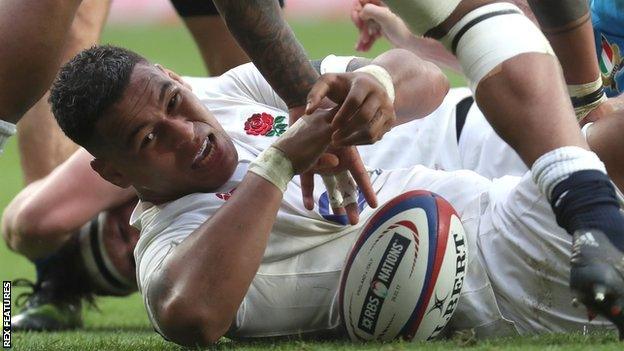World Rugby raises international eligibility period from three to five years
- Published

Nathan Hughes was born in in Fiji but qualified for England under the three-year residency rule
Rugby union's world governing body has voted to extend the residency qualification period for international players from three to five years.
The amended rule comes into effect at the end of 2020.
World Rugby, external says the change will ensure that players have a "genuine, close, credible and established link with the nation of representation".
"This is an historic moment for the sport," said World Rugby vice-chairman Agustin Pichot.
"National team representation is the reward for devoting your career, your rugby life, to your nation and these amendments will ensure that the international arena is full of players devoted to their nation, who got there on merit."
It is hoped that raising the residency qualification period from 36 to 60 months will give some protection to the smaller nations - particularly the Pacific Island teams - by discouraging their stars from pledging allegiance to other countries.
Last autumn, England gave starts to Fiji-born Nathan Hughes and Semesa Rokoduguni, who had qualified for Eddie Jones' side having lived in England for three years.
Jones has also recently included Sale's Auckland-born Denny Solomona in his squad, with the former rugby league winger set to become eligible for England in August.
France have previously declared they will only select players who hold a French passport in the hope it will reverse the national team's reliance on overseas-born players.
World Rugby chairman Bill Beaumont called the reform an "important and necessary step to protecting the integrity and credibility of international rugby".
The alteration to the residency rule was one of a number of changes made by World Rugby at its council meeting in Kyoto, Japan.
The council also approved expanded voting rights for Argentina and Japan, who will now have three votes each on the decision-making body with immediate effect.
French Rugby Federation president Bernard Laporte has been elected on to the World Rugby Executive Committee.
Analysis
Former England and British and Irish Lions centre Jeremy Guscott
The issue of nations getting in 'project players' to qualify on residency and build into international sides hasn't been particularly in the spirit of rugby.
There is nothing wrong with it - everyone has been doing it as it's in the laws and why wouldn't you use the laws to benefit your country?
I think it might stop so many Pacific Island and South African players moving abroad, although perhaps they will just come over at a younger age.
Hopefully it will see them commit to their domestic game and we will see those sides improve.
It is a long time for someone to commit to a new country and perform well enough over that time to make an international squad so I think five years is fair.
- Published9 May 2017

- Published29 March 2017

- Published18 January 2017
